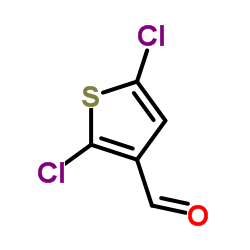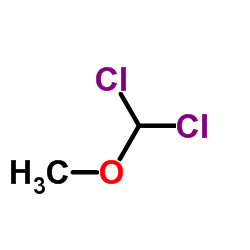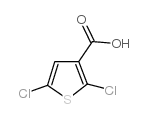2,5-Dichlorothiophene-3-carbaldehyde

2,5-Dichlorothiophene-3-carbaldehyde structure
|
Common Name | 2,5-Dichlorothiophene-3-carbaldehyde | ||
|---|---|---|---|---|
| CAS Number | 61200-60-0 | Molecular Weight | 181.040 | |
| Density | 1.6±0.1 g/cm3 | Boiling Point | 229.8±35.0 °C at 760 mmHg | |
| Molecular Formula | C5H2Cl2OS | Melting Point | N/A | |
| MSDS | N/A | Flash Point | 92.8±25.9 °C | |
| Name | 2,5-dichlorothiophene-3-carbaldehyde |
|---|---|
| Synonym | More Synonyms |
| Density | 1.6±0.1 g/cm3 |
|---|---|
| Boiling Point | 229.8±35.0 °C at 760 mmHg |
| Molecular Formula | C5H2Cl2OS |
| Molecular Weight | 181.040 |
| Flash Point | 92.8±25.9 °C |
| Exact Mass | 179.920334 |
| PSA | 45.31000 |
| LogP | 2.42 |
| Vapour Pressure | 0.1±0.5 mmHg at 25°C |
| Index of Refraction | 1.639 |
Synonym: Section 2 - COMPOSITION, INFORMATION ON INGREDIENTS
Risk Phrases: 20/21/22 36/37/38 Section 3 - HAZARDS IDENTIFICATION EMERGENCY OVERVIEW
Harmful by inhalation, in contact with skin and if swallowed. Irritating to eyes, respiratory system and skin. Potential Health Effects Eye: Causes eye irritation. Skin: Causes skin irritation. Harmful if absorbed through the skin. Ingestion: Harmful if swallowed. May cause irritation of the digestive tract. Inhalation: Harmful if inhaled. Causes respiratory tract irritation. Chronic: Not available. Section 4 - FIRST AID MEASURES Eyes: Flush eyes with plenty of water for at least 15 minutes, occasionally lifting the upper and lower eyelids. Get medical aid. Skin: Get medical aid. Flush skin with plenty of water for at least 15 minutes while removing contaminated clothing and shoes. Ingestion: Get medical aid. Wash mouth out with water. Inhalation: Remove from exposure and move to fresh air immediately. If not breathing, give artificial respiration. If breathing is difficult, give oxygen. Get medical aid. Notes to Physician: Section 5 - FIRE FIGHTING MEASURES General Information: As in any fire, wear a self-contained breathing apparatus in pressure-demand, MSHA/NIOSH (approved or equivalent), and full protective gear. Extinguishing Media: Use water spray, dry chemical, carbon dioxide, or chemical foam. Section 6 - ACCIDENTAL RELEASE MEASURES General Information: Use proper personal protective equipment as indicated in Section 8. Spills/Leaks: Absorb spill with inert material (e.g. vermiculite, sand or earth), then place in suitable container. Section 7 - HANDLING and STORAGE Handling: Avoid breathing dust, vapor, mist, or gas. Avoid contact with skin and eyes. Storage: Store in a cool, dry place. Store in a tightly closed container. Section 8 - EXPOSURE CONTROLS, PERSONAL PROTECTION Engineering Controls: Facilities storing or utilizing this material should be equipped with an eyewash facility and a safety shower. Use adequate ventilation to keep airborne concentrations low. Exposure Limits CAS# 61200-60-0: Personal Protective Equipment Eyes: Not available. Skin: Wear appropriate protective gloves to prevent skin exposure. Clothing: Wear appropriate protective clothing to prevent skin exposure. Respirators: Follow the OSHA respirator regulations found in 29 CFR 1910.134 or European Standard EN 149. Use a NIOSH/MSHA or European Standard EN 149 approved respirator if exposure limits are exceeded or if irritation or other symptoms are experienced. Section 9 - PHYSICAL AND CHEMICAL PROPERTIES Physical State: Liquid Color: Not available. Odor: Not available. pH: Not available. Vapor Pressure: Not available. Viscosity: Not available. Boiling Point: 56 - 60 deg C @ 0.2 mmHg Freezing/Melting Point: Not available. Autoignition Temperature: Not available. Flash Point: Not available. Explosion Limits, lower: Not available. Explosion Limits, upper: Not available. Decomposition Temperature: Solubility in water: Not available. Specific Gravity/Density: Molecular Formula: C5H2Cl2OS Molecular Weight: 181.04 Section 10 - STABILITY AND REACTIVITY Chemical Stability: Not available. Conditions to Avoid: Incompatible materials. Incompatibilities with Other Materials: Strong oxidizing agents. Hazardous Decomposition Products: Hydrogen chloride, carbon monoxide, oxides of sulfur, carbon dioxide. Hazardous Polymerization: Has not been reported Section 11 - TOXICOLOGICAL INFORMATION RTECS#: CAS# 61200-60-0 unlisted. LD50/LC50: Not available. Carcinogenicity: 2,5-Dichlorothiophene-3-carbaldehyde - Not listed by ACGIH, IARC, or NTP. Section 12 - ECOLOGICAL INFORMATION Section 13 - DISPOSAL CONSIDERATIONS Dispose of in a manner consistent with federal, state, and local regulations. Section 14 - TRANSPORT INFORMATION IATA Shipping Name: TOXIC LIQUID, ORGANIC, N.O.S.* Hazard Class: 6.1 UN Number: 2810 Packing Group: III IMO Shipping Name: TOXIC LIQUID, ORGANIC, N.O.S. Hazard Class: 6.1 UN Number: 2810 Packing Group: III RID/ADR Shipping Name: TOXIC LIQUID, ORGANIC, N.O.S. Hazard Class: 6.1 UN Number: 2810 Packing group: III Section 15 - REGULATORY INFORMATION European/International Regulations European Labeling in Accordance with EC Directives Hazard Symbols: XN Risk Phrases: R 20/21/22 Harmful by inhalation, in contact with skin and if swallowed. R 36/37/38 Irritating to eyes, respiratory system and skin. Safety Phrases: S 26 In case of contact with eyes, rinse immediately with plenty of water and seek medical advice. S 36/37/39 Wear suitable protective clothing, gloves and eye/face protection. WGK (Water Danger/Protection) CAS# 61200-60-0: No information available. Canada None of the chemicals in this product are listed on the DSL/NDSL list. CAS# 61200-60-0 is not listed on Canada's Ingredient Disclosure List. US FEDERAL TSCA CAS# 61200-60-0 is not listed on the TSCA inventory. It is for research and development use only. SECTION 16 - ADDITIONAL INFORMATION N/A |
| Hazard Codes | Xn:Harmful; |
|---|---|
| Risk Phrases | R20/21/22;R36/37/38 |
| Safety Phrases | S26-S36/37/39 |
| HS Code | 2934999090 |
|
~% 
2,5-Dichlorothi... CAS#:61200-60-0 |
| Literature: US6350749 B1, ; Page column 105 ; |
|
~49% 
2,5-Dichlorothi... CAS#:61200-60-0 |
| Literature: Belen'kii, Leonid I.; Gromova, Galina P.; Krayushkin, Mikhail M. Gazzetta Chimica Italiana, 1990 , vol. 120, # 6 p. 365 - 368 |
|
~% 
2,5-Dichlorothi... CAS#:61200-60-0 |
| Literature: European Journal of Medicinal Chemistry, , vol. 23, p. 477 - 482 |
| HS Code | 2934999090 |
|---|---|
| Summary | 2934999090. other heterocyclic compounds. VAT:17.0%. Tax rebate rate:13.0%. . MFN tariff:6.5%. General tariff:20.0% |
| 2,5-Dichlorothiophene-3-carboxaldehyde |
| 2,5-dichloro-3-Thiophenecarboxaldehyde |
| 2,5-dichloro-3-thenaldehyde |
| 2,5-Dichlor-thiophen-3-carbaldehyd |
| 2,5-dichlorothiophene-4-carboxaldehyde |
| 3-Thiophenecarboxaldehyde, 2,5-dichloro- |
| 2,5-Dichlor-thiophen-aldehyd-(3) |
| 2,4-DIFLUORO-3-METHYL-6-(TRIFLUOROMETHYL)ANILINE |
| 2,5-dichloro-3-formylthiophene |
| 2,5-dichloro-thiophene-3-carbaldehyde |
| 2,5-Dichloro-3-thiophenecarbaldehyde |



 CAS#:36157-41-2
CAS#:36157-41-2![Hydrazinecarbothioamide,2-[(2,5-dichloro-3-thienyl)methylene]- structure](https://image.chemsrc.com/caspic/284/5425-39-8.png) CAS#:5425-39-8
CAS#:5425-39-8